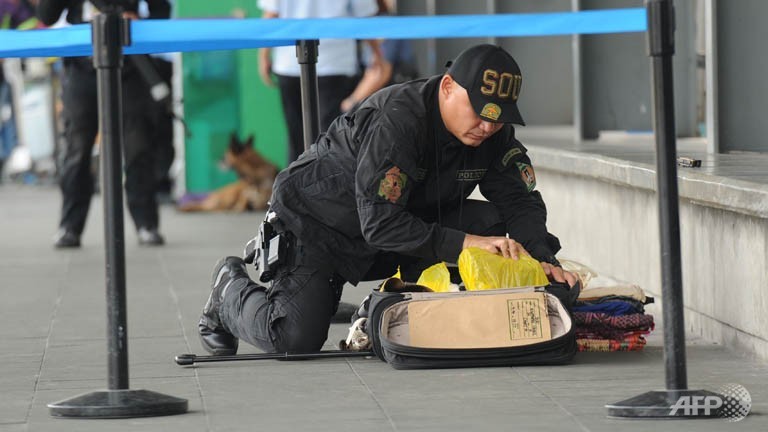Philippines foils 'anti-China' bombing plot

A Philippine police bomb disposal unit member inspects an abondoned luggage at the departure area of the airport in Manila on Sep 1, 2014, hours after a utility vehicle containing an "improvised explosive device" was found at the car park. (AFP/TED ALJIBE)
MANILA: Three men arrested over a foiled attempt to bomb the Philippine capital's airport were also planning to attack the Chinese embassy and one of Manila's biggest malls, authorities said on Tuesday (Sep 2).
The men, who were detained on Monday at the airport with a van containing petrol bombs and firecrackers, had planned a series of consecutive attacks, apparently to publicise their anti-China grievances, Justice Secretary Leila de Lima told reporters. "They claim to be defenders of the Filipino people and consider China and (Filipino-Chinese) oligarch taipans' monopolistic business practices and illegal mining as enemies," she said.
De Lima said the men appeared to be particularly angry at the Philippine government's perceived "soft" stance towards China in a long-running dispute over competing territorial claims in the South China Sea. De Lima said the group, which may involve more people than those detained, had planned a series of attacks on Monday at buildings linked to China or to the Chinese-Filipino business community.
"They also had plans yesterday to firebomb SM Mall of Asia in Pasay city and strafing the Chinese embassy and the DMCI building," she said. SM Mall of Asia is owned by Henry Sy, the Philippines' richest man who was born in China. DMCI is a construction firm owned by David Consunji, another ethnic-Chinese Filipino whom Forbes magazine lists as the country's sixth richest man.
HIDDEN AGENDA?
Nevertheless, de Lima said investigators were not convinced that the group's real intention was to express anger against China and Chinese interests. "We want to know how big this group is, what is their capacity really to create all this havoc, and what is their real agenda," de Lima said. "Are they on their own or are there (people) behind them? We will investigate all these."
The men - aged 43, 22 and 25 - worked as security guards for a textile company just outside Manila, according to investigators. But De Lima said the leader of the group claimed to belong to a secretive fraternity of police and military figures that had been linked to coup attempts in the 1980s which failed to topple then-president Corazon Aquino.
The current president is Benigno Aquino, Corazon's son, who has been an extremely popular president during his four years in office but has endured a few months of brutal political battles over a series of controversies. A senator-ally of Aquino alleged in July that retired military officials were trying to recruit troops to destabilise the government. The military reaffirmed its loyalty to Aquino following the senator's comments.
Despite the intense publicity and top-level concern that Monday's arrests generated, it appeared the suspects' plans were unsophisticated and they were not well armed, according to authorities. The four bombs found in the van at the airport were plastic bottles containing petrol that the attackers intended to plant at a toilet block, Rommel Vallejo, one of the lead investigators, told reporters.
The bombs' fuses were from firecrackers that would have given the suspects just eight seconds to flee after being lit, Vallejo said. A small handgun was also seized from the men, but no other weapons or ammunition had been found that would have enabled them to carry out any other attacks, according to Vallejo.
De Lima said the three would be charged with illegal possession of explosives and conspiracy to commit terrorism. However military chief General Gregorio Catapang ridiculed the suspects and their apparent plot. "This is just comic relief to get attention, it is not a terrorist attack," Catapang told reporters in a separate briefing, adding the airport bombs were "just firecrackers". Calls to a spokesperson for the Chinese embassy in Manila were unanswered.
What the stars mean:
★ Poor ★ ★ Promising ★★★ Good ★★★★ Very good ★★★★★ Exceptional
Latest News
More News
- Russian President congratulates Vietnamese Party leader during phone talks (January 25, 2026 | 09:58)
- Worldwide congratulations underscore confidence in Vietnam’s 14th Party Congress (January 23, 2026 | 09:02)
- Political parties, organisations, int’l friends send congratulations to 14th National Party Congress (January 22, 2026 | 09:33)
- 14th National Party Congress: Japanese media highlight Vietnam’s growth targets (January 21, 2026 | 09:46)
- 14th National Party Congress: Driving force for Vietnam to continue renewal, innovation, breakthroughs (January 21, 2026 | 09:42)
- Vietnam remains spiritual support for progressive forces: Colombian party leader (January 21, 2026 | 08:00)
- Int'l media provides large coverage of 14th National Party Congress's first working day (January 20, 2026 | 09:09)
- Vietnamese firms win top honours at ASEAN Digital Awards (January 16, 2026 | 16:45)
- ASEAN Digital Ministers' Meeting opens in Hanoi (January 15, 2026 | 15:33)
- ASEAN economies move up the global chip value chain (December 09, 2025 | 13:32)
















 Mobile Version
Mobile Version